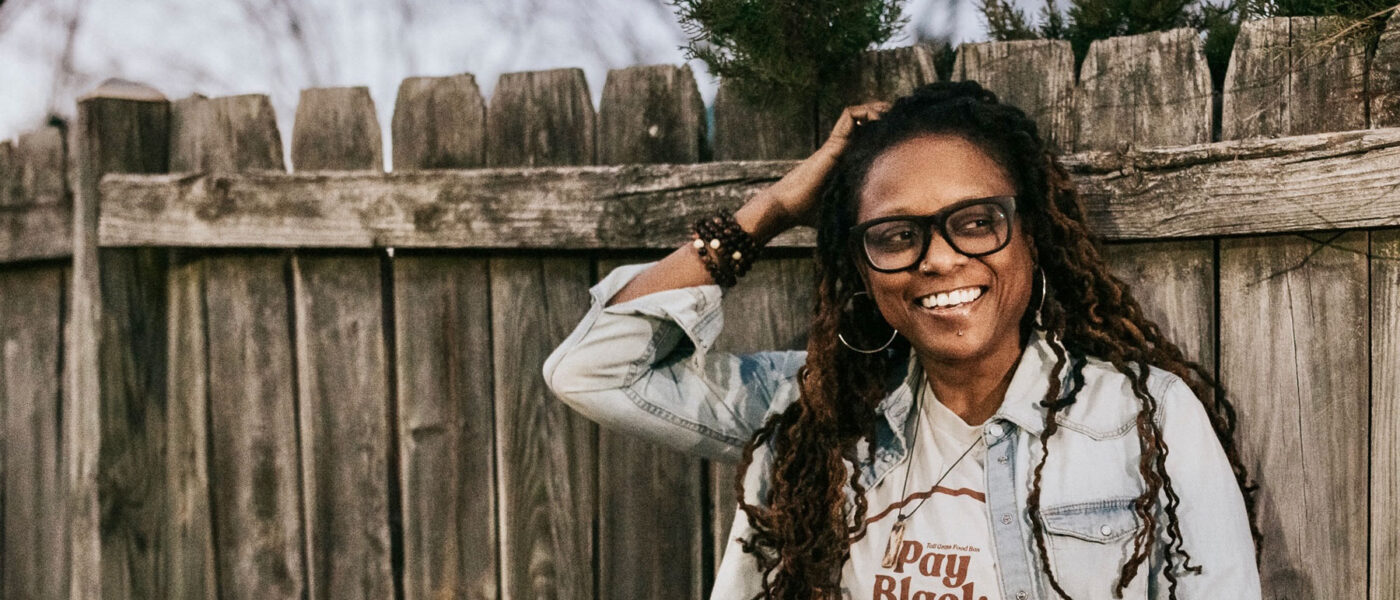We are excited to share this interview of Farm Aid’s Program Director Shorlette Ammons originally published on the U.S. Department of Agriculture (USDA) website on June 21. Shorlette joined the Farm Aid team last year, bringing a crucial lens to our work through her lived experience as a Black, rural (or “country,” as she puts it) person with deep roots in her community and the farm and food system. As a member of the USDA’s Equity Commission, Shorlette shapes the Commission’s work and brings a vital perspective back to Farm Aid for our work.
“Equity is the floor beneath which no one should fall. There should be a starting point everybody can reach, or at least have the opportunity to reach their goals or access resources they need to not just survive but to thrive.”
Encouraging Young Farmers to Embrace Their Roots Through Food and Music Connectivity
Growing up in Beautancus, North Carolina, U.S. Department of Agriculture Equity Commission Member Shorlette Ammons learned first-hand the impact of farming and food systems in rural communities. From a large line of farmworkers, cooks, and storytellers, Ammons leans on her experience and background to uplift the voices of those like her.
“The reason that I encourage young people from places like where I come from, the rural parts of this country, to continue to believe in the legacy of farming is because it’s an innate part of who we are, and we deserve to have that opportunity to farm and to thrive at it if we chose to follow in the [agrarian] footsteps [of our ancestors],” says Ammons.
Today, Ammons serves as Program Director at Farm Aid, a non-profit organization that helps build a system of agriculture that values family farmers, good food, soil and water, and strong communities. In her work, Ammons actively engages and supports farmers and farmworkers. As June marks African American Music Appreciation Month, Ammons reflects on her upbringing where food and music were a constant that brought her family together and finds the same energy empowering and impactful at Farm Aid where its annual festival celebrates music, food, and family farmers.
“I’m invested in this work [in part]…because I believe in what we are owed, particularly Black…brown people, and rural people,” Ammons shares. “We don’t necessarily have to believe in the system [as it stands], but we can believe that we are owed a better opportunity to change the system [and to be compensated and remedied for how the system has harmed so many of us].”
It’s what has also called Ammons to join the Equity Commission. “Success for the Equity Commission means that people who have been directly impacted by the discriminatory practices that have historically plagued USDA [find] a remedy within these recommendations,” Ammons says.
Ammons recalls the definition of equity that was shared with her by a mentor, “Equity is the floor beneath which no one should fall. There should be a starting point everybody can reach, or at least have the opportunity to reach their goals or access resources they need to not just survive but to thrive.”
For her position on the Equity Commission, Ammons defines equity as the experience of stakeholders having a resource within USDA that they can rely on, that they can go to for needful resources, and that will benefit particularly young, Black, and brown farmers for generations to come. “Equity means that customers have what they need to keep the farming legacy alive and some means of helping them get to where they should be had there not been systematic barriers in place, directly and indirectly,” Ammons states.
Looking ahead, Ammons is optimistic for aspiring new and beginning farmers, “I’d tell them they are appreciated, that they’re needed, and that we see you,” she says.



